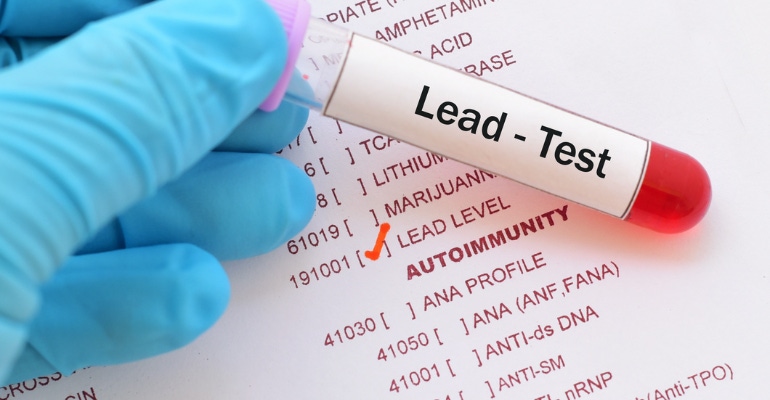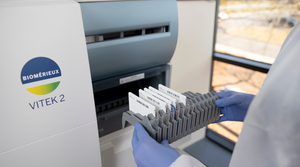Ex-Magellan Execs Indicted on Criminal Charges Over Faulty Lead Tests
The former executives have been charged with fraud and accused of concealing a malfunction in Magellan Diagnostics' lead-testing devices.
April 7, 2023

One of medtech’s biggest losers of 2017 is the reason three former Magellan Diagnostics executives are now facing multiple criminal charges.
The Billerica, MA-based company’s former CEO (Amy Winslow of Needham Heights, MA), COO (Hossein Maleknia of Bonita Springs, FL) and Reba Daoust (director of quality assurance and regulatory affairs of Amesbury, MA) are accused of concealing a device malfunction that allegedly produced inaccurately low lead test results for tens of thousands of children and other patients.
All three former executives were charged with conspiracy to commit wire fraud, wire fraud, conspiracy to defraud an agency of the United States, and introduction of misbranded medical devices into interstate commerce with intent to defraud and mislead, according to the U.S. Attorney's Office, District of Massachusetts.
Magellan’s devices – LeadCare Ultra, LeadCare II and LeadCare Plus – were designed to detect lead levels and lead poisoning in the blood of children and adults using either venous (blood draws through the arm) or fingerstick samples. LeadCare II, which was predominantly used to test fingerstick samples, accounted for more than half of all blood lead tests conducted in the United States from 2013 through 2017. LeadCare Plus and LeadCare Ultra were predominantly used to test venous samples.
“Today, we arrested three former senior executives at Magellan Diagnostics for hiding a serious flaw in the lead testing devices the company produced, resulting in inaccurate test results for tens of thousands of children and other patients. We believe these executives knew about this malfunction for years but failed to come clean to their customers and the FDA about it in order to boost their company’s bottom line,” said Joseph R. Bonavolonta, special agent in charge of the Federal Bureau of Investigation, Boston Division. “The last thing sick children and their parents should have to worry about is whether diagnostic tests and devices live up to their manufacturer’s claims. This case should make it crystal clear to all companies that do business in Massachusetts, healthcare or otherwise, that they will be brought to justice for misleading consumers with false promises about their products.”
Winslow and Daoust made an initial appearance in federal court in Boston, MA on Wednesday, and Maleknia made an initial appearance in federal court in Tampa, FL on Wednesday.
Magellan allegedly gambling on patient safety
FDA launched an investigation in May 2017 to find out why a blood lead testing system manufactured by Magellan Diagnostics may provide falsely low results. Magellan is owned by Cincinnati, OH-based Meridian Bioscience, and its devices were the only lead-testing products cleared by FDA at the time.
The investigation stumped FDA, but a stern warning letter from FDA in October 2017 cited several violations of federal law concerning Magellan’s handling of the situation.
According to the warning letter, customers complained to Magellan as far back as August 2014 that there were discrepancies in the results provided by the LeadCare Ultra Test System, but the company failed to report the complaints to FDA within the required 30 days. Magellan did eventually notify FDA of the situation, but not until April 2015.
The company apparently tried to address the problem on its own by changing the amount of time that the mixture of blood samples with the reaction substance must sit before it is analyzed. FDA said the company did not get permission from the agency to market that change.
The Centers for Disease Control and Prevention (CDC) recommended that children younger than 6 years, pregnant women, and nursing mothers who have been tested for lead exposure be retested if their test result was less than 10 mg per deciliter of blood.
FDA said at the time the Magellan testing systems could still be used with blood from a finger or heel stick, as opposed to blood drawn from a vein.
The former Magellan executives allegedly learned that a malfunction in their LeadCare Ultra device could cause inaccurate lead test results – specifically, lead test results that were falsely low – during the FDA clearance process around June 2013. The defendants, however, allegedly released LeadCare Ultra to the market in December 2013 without informing customers or FDA of the malfunction.
Several months after the release, LeadCare Ultra customers independently discovered the malfunction and complained about inaccurate results. It is further alleged that the defendants drafted and caused Magellan to provide false and misleading statements to customers that they “recently identified cases” of the malfunction and they did not observe the malfunction “in our clinical trials prior to the product release.” According to court documents, the defendants, in fact, had known about the malfunction for over a year, including before the product release, the authorities noted.
By allegedly hiding the malfunction and later deceiving customers and FDA about when they discovered the malfunction, the nature, extent and frequency of the malfunction, and the risks associated with the malfunction, the defendants caused an estimated tens of thousands of children and other patients to receive inaccurately low lead test results, U.S. Attorney's Office, District of Massachusetts said.
Magellan’s testing in 2013 also indicated that the same malfunction affected the LeadCare II device, which was by far Magellan’s highest-revenue product.

Winslow and Maleknia, however, were positioning Magellan for sale, which could have been put in jeopardy if there was a malfunction affecting LeadCare II. It is alleged that Winslow told a Magellan employee to stop studying the malfunction in LeadCare II devices because Magellan needed to maintain “plausible deniability.” Only after Magellan was acquired by Meridian Bioscience for $66 million in March 2016, did the defendants notify customers and FDA about the LeadCare II malfunction. Magellan’s report to FDA about LeadCare II allegedly made materially false and misleading statements and concealed material facts about Magellan’s discovery of the malfunction in LeadCare II. The feds also note that after Meridian acquired Magellan, Winslow received a bonus of about $2 million and Maleknia received a bonus of about $448,000.
Meridian and subsidiaries are not defendants
Meridian said in a public statement that the company is not a defendant in this case.
"Meridian and Magellan have cooperated extensively with federal authorities in the investigation that led to these charges, and we have been and will continue to engage in resolution discussions with the Department of Justice," Meridian said.
The company expects a loss to be "probable" in connection with the resolution, and has reserved, as of calendar year-end 2022, "an amount we believe to be a reasonable estimate of such loss."
There is no safe level of lead in the blood
“According to the CDC, there is no safe level of lead in the blood. Additionally, young children and pregnant mothers from low-income households living in public housing are the most vulnerable to lead exposure. We allege that these defendants deceived customers and the FDA about the reliability of medical tests that detected lead levels. By doing so, we assert that they endangered the health and lives of incredibly vulnerable victims,” said U.S. Attorney Rachael S. Rollins. “This office, along with our other law enforcement partners, will vigorously investigate and prosecute those who put corporate profits before patient health. Here, we allege the personal gain is at the expense of poor people, children, and individuals who are pregnant. We pledge to advocate on these victims’ behalf and hold bad corporate actors accountable.”
According to court documents, the defendants only filed an FDA report for LeadCare Ultra after an outside consultant told Magellan that if they did not notify the FDA about the malfunction, the consultant would.
In 2017, FDA contacted Magellan and asked when the company first discovered the malfunction. It is alleged that, at Daoust and Maleknia’s instruction, Magellan’s representative falsely told the agency the company first discovered the problem after receiving customer complaints in late 2014 and shortly before Magellan notified FDA in 2015 – even though Magellan actually discovered the malfunction almost four years earlier, in 2013. Winslow also allegedly caused Magellan to send a false timeline to FDA, which omitted the company’s internal 2013 studies about the malfunction.
“Concealing the fact that a device is producing inaccurate lead test results to boost profits while knowing that there is no safe level of lead in the blood, as alleged in this case, is a brazen disregard to the health and safety of our program beneficiaries,” said Phillip M. Coyne, Special Agent in Charge for the U.S. Department of Health and Human Services, Office of Inspector General. “Today’s arrests should serve as strong reminder that we will never tolerate such behavior that puts patients at risk.”
FDA ultimately found that the LeadCare devices could not accurately test venous samples, leading to a recall of all LeadCare devices using venous samples and a warning to the public not to use LeadCare Ultra, LeadCare II, and LeadCare Plus for venous blood samples because of the malfunction.
Lead exposure may cause irreversible lifelong physical and mental health problems. Young children and pregnant women are most vulnerable to lead exposure, especially those from low-income households and those who live in housing built before 1978 because those homes are more likely to contain lead-based paint and have fixtures containing lead.
FBI seeks potential victims of this alleged crime
If you or a family member believe you received an inaccurate blood lead test result from a LeadCare device between 2013-2017, the FBI would like you to complete the questionnaire located on the FBI’s website.
The charges of wire fraud and wire fraud conspiracy as alleged in the indictment provide for a sentence of up to 20 years in prison, up to three years of supervised release, and a fine of up to $250,000.
The charge of conspiracy to defraud an agency of the United States provides for a sentence of up to five years in prison, up to three years of supervised release, and a fine of up to $250,000. The charges of introduction of misbranded medical devices provide for a sentence of up to three years in prison, up to one year of supervised release, and a fine of up to $250,000. Sentences are imposed by a federal district court judge based upon the U.S. sentencing guidelines and statutes which govern the determination of a sentence in a criminal case.
About the Author(s)
You May Also Like



